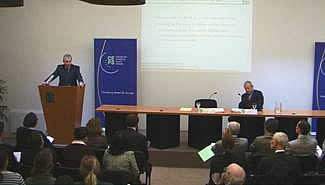Prime Minister Leterme stressed the importance of the new European emergency fund. Belgium adopted as second member-state the new EFSF well, and this almost by consensus. He did not exclude that the lending capacity of the European Stability Mechanism could be increased.
To the Premier economic growth is an indispensable condition to stabilize the debt. He therefore proposed some time ago for additional funds in the Greek economy in order to inject the negative growth rates to counteract that the necessary fiscal consolidation hamper. Before the Greek crisis in May 2010, Leterme had proposed to establish a European Debt Agency. Today he repeated that this is might be a realistic approach to achieve the creation of Eurobonds, which is the ultimate solution, as part of a strict fiscal policy.
In addition, more powers to the EU should be transferred to evolve to a full European economic government. This could be done initially through strengthen the existing institutions, especially strengthen the status of the Eurogroup, and by making the position of the chairman of the Eurogroup full-time.
The crisis is a common European responsibility. The euro benefits all of us. Europe decided to keep the euro and to take measures to assure. In doing so, there is impact of European governance on member-states and the way forward to make the E in EMU as important as the M: a new economic governance for the eurozone and the EU. Some member-states integrated efficiently, Greece entered on wrong figures.
Some main reasons that gave cause for the present situation were the ignore of SGP agreement, the slow reactions by EU and the watering down of the Lisbon process.
Breaking up the euro is no option anymore: it starts a process of European disintegration, consequences for banks and other member-states are hard to foresee and to control. There is precisely some progress in ecenomic policy coordination. Europe 2020, and the Euro Plus Pact, the European Semester, a financial supervisory structure, meetings of HOGS of the eurozone, for symmetry a Six Pack that should prevent macro-economic imbalances by strengthening fiscal policy coordination, and a rescue fund (EFSF) that has been created, improved and increased. |

